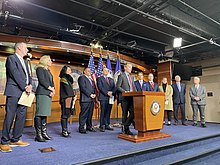Problem Solvers Caucus
[9] Then co-chairs Reed and Gottheimer said in 2017, "We all knew the partisanship in Washington had gotten out of control and felt the need to create a bipartisan group committed to getting to 'yes' on important issues.
[12] The second part of the Problem Solvers plan would have provided relief to help states deal with the high cost of pre-existing and chronic conditions.
[10] The plan would have also eliminated the Medical Device Tax, an excise charge of 2.3 percent, which opponents claim is passed onto consumers and reduces funds for research and development.
[14][15] In September 2020, the Problem Solvers released their "March to Common Ground" COVID-19 relief package, an outline for a Congressional bipartisan compromise that showed that members of both parties were willing to listen to each other in order to craft legislation.
[19][20] Within the caucus, the Republican argument that defending the Speaker would protect the institution was met with the Democratic rebuttal that McCarthy refused to certify the 2020 election.
[23] The New York Times reported in May 2023 that the Democratic wing of the caucus is in "open revolt" over No Labels' progress in pursuing a third-party presidential ticket for 2024.
[50] Tom Reed, former Republican co-chair said in 2019, "The Problem Solvers Caucus has been finding itself in the middle of several key battles and make common cause with its natural Senate allies".

